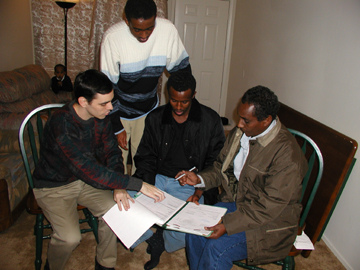As a refugee case manager, I have the opportunity to aid families from all over the world in making their adjustment to living in the US. Since August 1999, I have worked as a case manager at World Relief in Atlanta, GA. Primarily, I am responsible to see that newly arriving refugees have some basic necessities when they arrive and that they receive initial orientation and instruction to get established to live on their own. While that sounds fairly straightforward, real life is a complicated affair. My time with a family may start with giving practical aid such as meeting them at the airport and bringing furniture to their home. I may have a plan for programs and training to try to prepare them for independence. Very quickly, however, the challenges begin. If the children arrive sick, will the local doctor be willing to treat them? Could the family that has never seen a stove cause a fire in their home? Will the local government bureaucrat assume the family is illegal and refuse to help them? How do I convince a former doctor that he has to take a factory job to survive? How does a family that can't even read keep up with the paperwork required to maintain the assistance that keeps their children fed? What about the marriage threatening to fall apart simply because it cannot take the stresses of the transition? What happens when there are no jobs for anyone in the family and there is no money to pay the rent?
These are challenges that my coworkers and I are quite accustomed to dealing with. The great thing is that in helping families cope with these challenges, I get to spend time with them in their home. There I learn about their home countries and customs, taste their food, hear their language. I learn how to appreciate simple freedoms which we take for granted that these families have never known. I feel humbled to hear their stories of survival in the face of adversity. I have the chance to share some knowledge with them that could help them have a positive start for the future. Whether an extended family from Somalia or a single individual from Bosnia, this job requires both an appreciation of the cultural background of the refugees and, more significantly, a real desire to see them succeed. Though it takes much time and effort, it is seeing that success which gives the job its meaning.
Return to main page |

